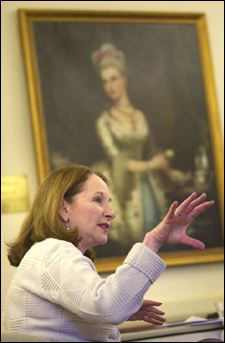Women’s movement, or lack of it
To explain paucity of gains, Kellerman counsels a look in the mirror

Forty years after the birth of the women’s movement, women need to look at themselves, rather than at men or at society, for reasons why there aren’t more women heading companies, earning top dollars, or running governments.
That’s the message delivered by Barbara Kellerman, research director of the Center for Public Leadership, to about 20 women who gathered for a Committee on the Concerns of Women brown-bag lunch Wednesday (Feb. 11) at the Radcliffe Institute for Advanced Study’s Agassiz Hall.
“The reasons we have historically blamed others may be less valid than we’ve talked ourselves into believing over the last several decades,” Kellerman said. “I am here to ask today, dear women, whether the fault lies not in the stars, but in ourselves.”
Kellerman acknowledged at the start of her talk that the subject is extraordinarily touchy, and smacks of “blaming the victim.” But the evidence, she said, shows that something is at work beyond women being held back by prejudice, stereotype, and sexism.
And that something may be choice.
When given the choice, many women at some point in their careers leave the work force to have babies and raise their families. Further, she said, women aren’t merely forced to do so by biological necessity. Many women prefer to spend more time with their children.
If that’s the case, Kellerman said, then perhaps the reason it appears women have made so little progress is that progress is measured by the wrong yardstick. When measured by things traditionally thought important by men – power, prestige, and pay – women have a long way to go. Perhaps the debate, Kellerman said, shouldn’t be so much about equality as about diversity and about society valuing what women want just as much as it does what men want.
“The presumption that what men want and what women want is the same is almost certainly wrong,” Kellerman said.
Kellerman’s talk was sponsored by the Committee on the Concerns of Women at Harvard (CCW), a University-wide organization founded in 1977 that serves as a forum for women’s issues and concerns.
In addition to serving as the Center for Public Leadership’s research director, Kellerman was the center’s executive director from 2000 to 2003. She is a lecturer in public policy at the John F. Kennedy School of Government and has held professorships at Fordham, Tufts, Fairleigh Dickinson, George Washington, and Uppsala Universities.
She also served as dean of graduate studies at Fairleigh Dickinson and as director of the Center for Advanced Study of Leadership at the University of Maryland’s Academy of Leadership.
Her most recent book, “Reinventing Leadership: Making the Connection Between Politics and Business,” was published in 1999. Her next book, “Bad Leadership,” is expected this fall.
Barbara Barry, co-chair of the CCW’s Steering Committee, said she thought Kellerman’s message was an important one.
“I think it’s very provocative in a way. I don’t think it’s going to be a popular message,” Barry said. “I think it’s an important message that people need to consider.”
During questions and answers after her talk, Kellerman urged women to continue to work for change, both inside and outside of Harvard, but said to expect it to be difficult. She also addressed concerns that opponents of women’s rights would seize on her reasoning.
“I don’t think anyone in this world is in a position not to declare the truth just because they’re afraid of how the opposition might use it,” Kellerman said.
Kellerman said that “appalling gaps” in the levels of pay, power, and status still exist between men and women, but she also said the hurdles that kept women from advancing in business and in government 40 years ago are largely gone.
“Women today can enter a path of leadership cleared of obstacles by those who came before, but they must choose to walk that path,” Kellerman said.
But leadership and business success are extraordinarily costly, Kellerman said. People who rise to the top in their organizations have to dedicate themselves to their work, often to the exclusion of almost everything else.
“One of the things about leadership that people don’t comprehend is how incredibly time-consuming it is,” Kellerman said.
Kellerman zeroed in on childbearing as the critical difference between men and women, particularly where it affects progress in the workplace. Like it or not, she said, women are the ones who have babies, and the pressures and choices forced upon women when they start families have enormous consequences.
“Women aren’t only obligated to spend time with their kids, we actually want to do this,” Kellerman said, adding that the importance of this preference is almost impossible to overstate.
The result, enacted over and over again in American society, Kellerman said, is that women who have the choice to stay home often do, at least for a few years or in a part-time work setting.
Compared with men who remain in the workforce, these women lose valuable time climbing up the corporate ladder.
While the fight for equal opportunities and equal pay needs to continue, Kellerman said, things useful to women trying to juggle work and family, such as the ability to telecommute, flexible hours, and better family leave policies, should also be emphasized.
“It just might be time for women to look at their issues in terms of diversity rather than equality,” Kellerman said. “Rather than saying, ‘I want what he wants,’ say, ‘I want what I want and I want what I need.’”




